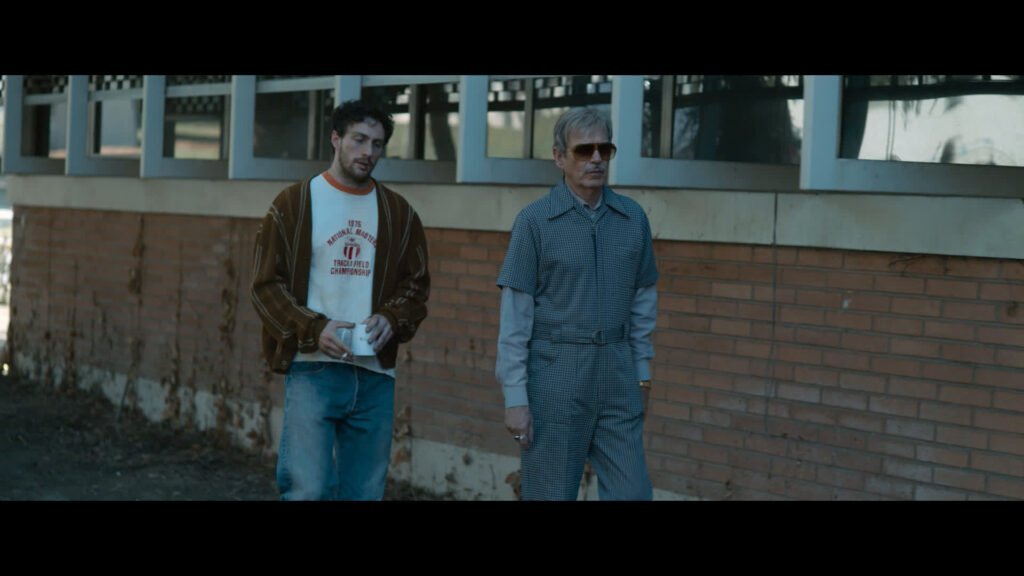
A Million Little Pieces
My mind must have done a number on the specifics of James Frey’s real-life writerly scandal, because it took me about 30 minutes into the movie of his addiction memoir “A Million Little Pieces” to wonder why a true story would feel false.
What I mean is that it felt too familiar not in the way that clichés become clichés, but in the way that timeworn showbiz tropes become all but invisible. Originally published as a memoir by Random House in 2003 and championed by Oprah Winfrey on her TV book club, Frey’s source book became infamous in 2006 when The Smoking Gun revealed that many of the dramatic and/or salacious details of his supposedly nonfictional account couldn’t be verified (among them a tragedy whose Rosebud like heft helped send our hero spiraling). Nor could anyone find a police mugshot of Frey, despite his claims to have been arrested for various outrageous crimes. The publisher ended up retracting its designation of Frey’s book as an actual autobiography, offering refunds to readers who felt betrayed.
The film treats it simply as a story, not even bothering to address or refute the claim that parts or most of it were made up, let alone doing so with skepticism or disdain. Which is fair enough: As any number of classic movies from “Young Mr. Lincoln” and “Dillinger” through “Nixon” and “The Irishman” have demonstrated, a narrative does not have to be factually verifiable to convey some kind of truth (or illumination or provocation or excitement). The trouble is that once you take away Frey’s initial promise this really happened! all you’re left with is something that seems like an unremarkable boastful variation on stories other movies, both factual and fictional, have told better before.
This movie is directed by Sam Taylor-Johnson, who does a confident if slightly too slick job, and anchored by her husband Aaron Taylor Johnson, who gives a soul and body baring lead performance as James Frey, a crack addict, alcoholic and all-around mess who falls off a balcony during a drug binge, shattering his face and winding up in a rehab clinic.
Once there, he encounters variations on characters we’ve seen in other fiction films (and TV drama episodes and novels and memoirs) about recovery in private facilities: the tough but compassionate counselor (Juliette Lewis) who unpacks a childhood trauma that explains everything; the terse but wise African-American roommate/sorta mentor (Charles Parnell, playing a character named I kid you not Miles Davis); the world weary droll compassionate older white dude (Billy Bob Thornton) who refuses to give up on the young hero no matter how petulantly he derides the twelve step program, mocks God and insists he’d rather walk out and start getting high again.
There’s also a beautiful young female patient named Lily (Odessa Young) who seems like the rehab drama version of a Manic Pixie Dream Girl: the life force who reawakens the hero’s dormant sense of possibility. And there’s an unnerving menacing wild-eyed effeminate predatory fellow patient played by Giovanni Ribisi with lisp, hand waves did nobody involved with this production have sufficient nerve to suggest that this character was perhaps not such a good idea or Ribisi such bad casting?).
But even though its source material is tainted by being exposed as falsehoods passed off as truth by Frey himself, it’s easy to see why they fought to make this film anyway. It’s what’s known as a star vehicle or showpiece in terms of directorial and acting demands; the emotions are raw and big, the constant threat of humiliation injury death marks this is as the opposite of today’s go to mode of American entertainment, the smirky kid friendly fantasy; here the star suffers like a Gibson martyr, with the world beating the tar out him every five minutes as karmic punishment for his tragic misjudgments and refusal to see his situation clearly. It begins with a drug fueled nude dance and gets more flamboyantly masochistic from there: multiple injuries and doctor’s visits, hallucinations and scatological situations (including a dance in a shit-filled hallway), clumsy fight in a shower, scene of gory dental surgery.
But ultimately there’s not much to distinguish this story from other stories we’ve seen before about drug addicts getting sober in private facilities under suspicious circumstances 28 Days, Permanent Midnight, last year’s Beautiful Boy and this year’s Honey Boy. You can feel the weight of its most tiresomely common elements pressing down on you throughout: contemplative yet hardboiled voice over narration; gradually expanding flashback revealing terrible event; hero gets pen-and-paper and starts cathartically writing book that will become movie you’re watching.
The director is correct to insist that it doesn’t matter for storytelling purposes whether any part of this tale is factually true; what matters is that it does not end up feeling like just another set of minor variations on the usual. But unfortunately, that’s where A Million Little Pieces ultimately lands.
It’s the film where you try to predict which of the characters will turn out to have been imagined by the narrator. All of them, obviously.
Watch A Million Little Pieces For Free On Gomovies.
.jpg?w=1024&resize=1024,1024&ssl=1)
.jpg?w=1024&resize=1024,1024&ssl=1)
.jpg?w=1024&resize=1024,1024&ssl=1)
.jpg?w=1024&resize=1024,1024&ssl=1)
.webp?w=1024&resize=1024,1024&ssl=1)
.jpg?w=1024&resize=1024,1024&ssl=1)
.jpg?w=1024&resize=1024,1024&ssl=1)
.jpg?w=1024&resize=1024,1024&ssl=1)